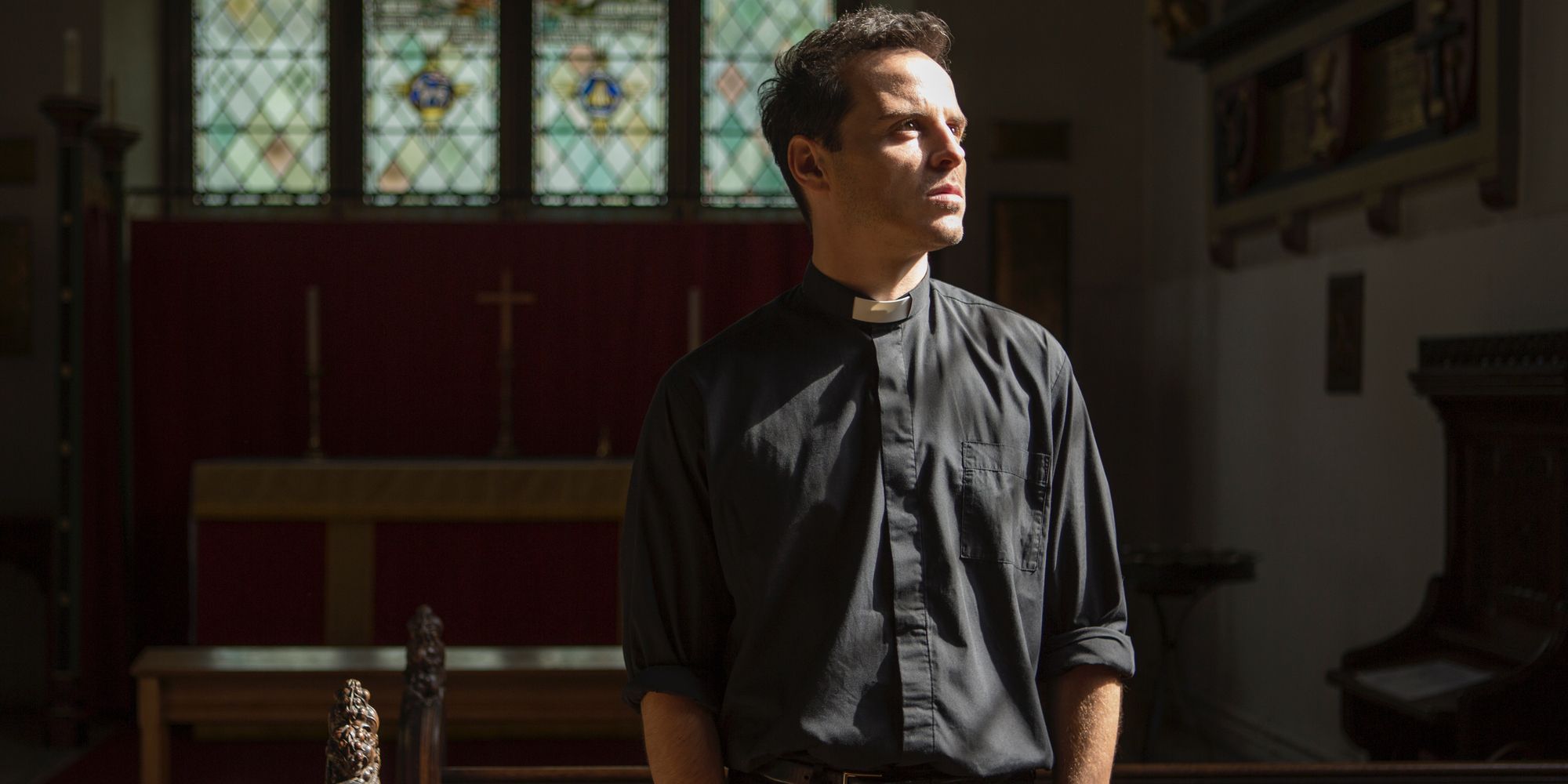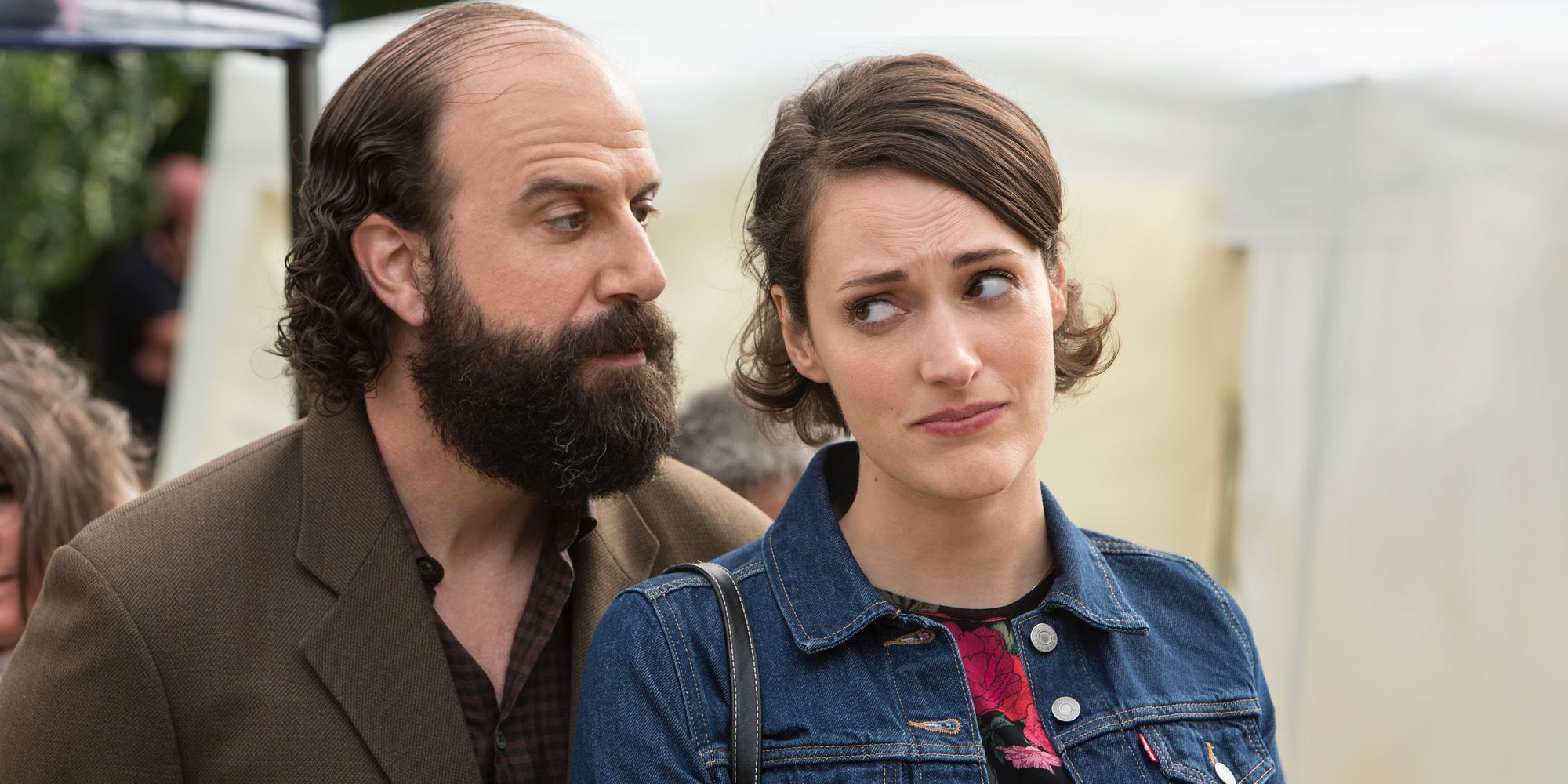The second season of Phoebe Waller-Bridge’s fourth wall-breaking comedy Fleabag begins with the title character staring at her bloodied face in the bathroom mirror of a restaurant. It’s a sort of re-introduction for the audience that alludes to the character’s inherently caustic nature, but it also serves as a reminder of her tendency to discuss her sometimes crude inner thoughts, wild impulses, and deeply felt heartache. The structure of the scene delivers the outcome before telling the audience how it came to be, thereby making the disastrous dinner between Fleabag and her semi-estranged family — sister Claire (Sian Clifford), father (Bill Patterson), brother-in-law Martin (an out of control Brett Gelman) and soon-to-be stepmother (Olivia Colman, who is equally out of control) — all the more uncomfortably entertaining, especially because Waller-Bridge is acting as both participant and audience member, occasionally commiserating with the viewer over the delightful unpleasantness of it all.
The other member at the table is the season’s new character, a handsome, foul-mouthed priest played by Andrew Scott (Sherlock), who Fleabag is almost immediately attracted to. At that point, Waller-Bridge uses her character’s fourth wall-breaking tendencies to make the audience — her “friends,” as she slyly lets those watching along at home know during a therapy session with Killing Eve co-star Fiona Shaw — complicit in her desire to “f**k a priest,” which, as it turns out, is largely the inciting incident for the second season.
But Fleabag’s potentially sacrilegious pining over a man of the cloth isn’t intended to be read as such. Sure, Waller-Bridge addresses the moral implications of the forbidden flirtation that slowly turns into something more, but the show mercifully isn’t interested in treating their obvious attraction to one another as explicitly and solely sinful. Instead, it becomes a way for two people to connect, and for Waller-Bridge to bring a little something unexpected to the table with regard to the show’s use of direct address. That both the priest and Fleabag have relationships with an unseen entity (God or the audience) offers the character what seems to be her first real emotional (or spiritual, if you will) connection with another person since the death of her friend Boo.

That death (and Fleabag’s role in it) was the inciting incident for season, triggering the show’s exploration of its character’s self-destructive choices, whether they were a result of her overwhelming grief or not. In season 2, then, Waller-Bridge looks to make the shared connections between would-be lovers and their ostensible imaginary (?) friends/coping mechanisms the story’s most important through-line. The effort turns each of Fleabag’s direct addresses into more than funny in-jokes between the viewer and the protagonist. The result lends the series a surprising amount to gravitas, right up until the unforgettable final scene.
Yet there’s more to season 2 than that. The series picks up just over a year after the end of season 1, which is just enough time for the fractured relationships between Fleabag and her sister, as well as her self-absorbed stepmother, to need to be addressed. The pending nuptials between Fleabag’s father and Colman’s character works as the necessary opportunity to mend fences, even though most of the people involved have no idea how best to go about doing that.

The success Waller-Bridge has had in the intervening years since Fleabag season 1 is indicative of just how well-received the series was and how easily her talents are lent to a variety of different stories. Killing Eve is the obvious example, as that show brought a similar kind of tonal variance in the first half of season 1, often finding new and exciting ways to shift from broad comedy to conspiracy thriller to love story without overdoing it in one regard or rendering any single part inert. The same is true here, though Fleabag makes more room for broad comedy, which often leads to laugh-out-loud moments (a memorable ride in an elevator with Claire is a good example), but also manages to leave the door open for an observation of what it is that makes these people tick, what their damage is, and why it’s so easy and fulfilling to feel empathy toward them, even when they’re acting on negative impulses or against their best interest.
That’s particularly true with regard to Scott’s priest, who, despite being a brand new character, is so incredibly well written (as all the entire cast is) that he brings a surprising extra dimension to the series overall. Like Waller-Bridge, Scott is particularly adept at moving between humor and deeply felt pathos without overdoing it. As such, when the two share the screen, and when his character takes note of her addressing the audience, Fleabag (both the character and the series) find the necessary ingredient that takes the story to a logical, emotionally satisfying conclusion and one that, in many ways, surpasses even that which came before.
Fleabag season 2 streams exclusively on Amazon Prime Video beginning Friday, May 17.




